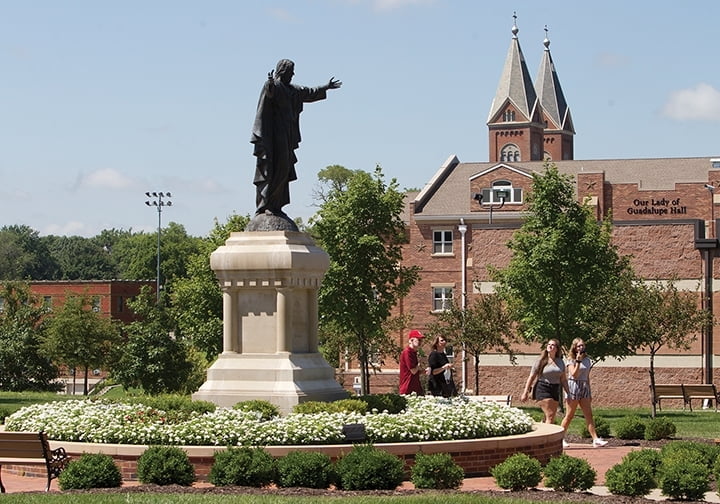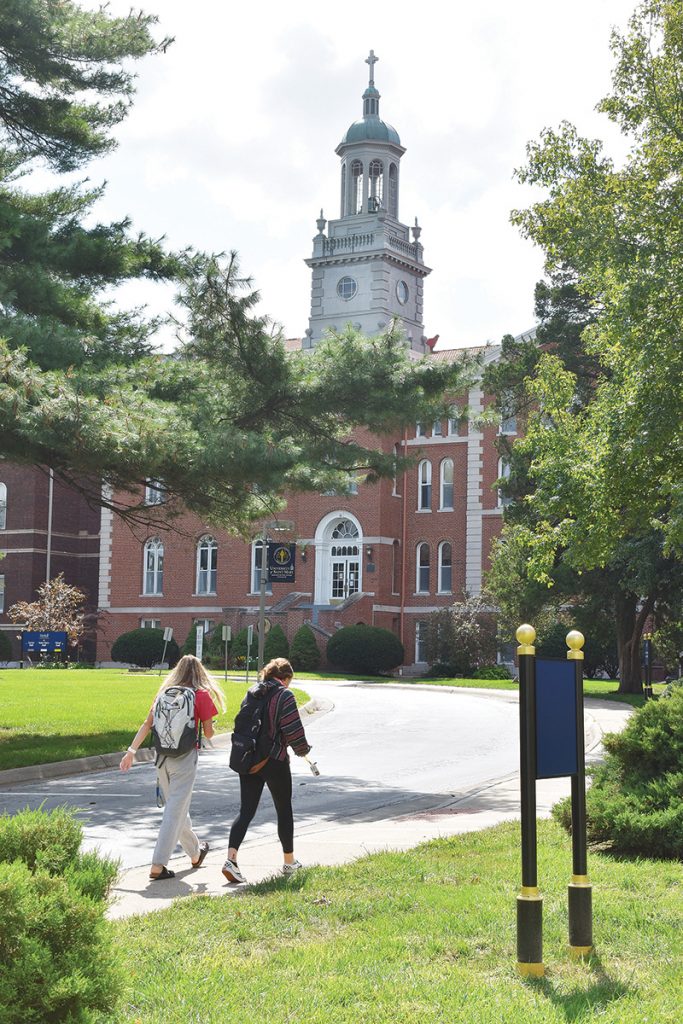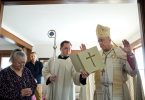
by Katie Peterson
Special to The Leaven
LEAVENWORTH — When schools closed their doors this past March, administrators of the three Catholic colleges in the archdiocese had no idea what the fall semester would bring.
“The experts around the country started writing these articles that colleges, especially small colleges, should expect enrollment decreases,” said Stephen Minnis, president of Benedictine College in Atchison. “We were also seeing reports that online education is the future, and it’s the way to go. This is what young people desire.”
“We became very concerned,” he added.
COVID restrictions impacted normal recruiting methods, too.
“We weren’t able to do in-person visits and we weren’t able to do in-person registration days,” said John Schultz, vice president for marketing and admissions for the University of Saint Mary in Leavenworth. “We were concerned with the high school students all going remote — where their minds would be at in terms of a college search at that juncture.”
“For Donnelly, our students tend to make their decision during that second semester of their senior year in high school . . . or even over the summer between their high school graduation and the start of the fall,” said Msgr. Stuart Swetland, Donnelly College president. “So, it really was a different year because we really had to rely on different methods of recruiting.”
The efforts of the colleges to change up their recruiting approaches didn’t go unrewarded, though, as all three saw an increase in enrollment numbers.
Benedictine enrolled a record number of students, including 581 freshmen, compared to the previous high of 570 in 2018, and 1,980 total full-time undergrad students compared to the previous high of 1,930 in 2019.
USM enrolled a total of 195 freshmen compared to 149 in 2019 and 83 transfers compared to 123 in 2019. Total enrollment between all programs both at the main campus in Leavenworth and the Overland Park campus was 1,231 students, an estimated 2.5% increase.

Donnelly enrolled 150 new students including freshmen and transfers, a 34% increase from 2019, and enrolled 333 students total, an 18% increase from 2019. Donnelly has also been ranked No. 1 for ethnic diversity on campus; No. 3 in economic diversity on campus; and No. 3 in least amount of debt upon graduation in the U.S. News and World Report’s 2020 Best College Rankings for the Midwest Region.
“What we’ve found is that young people hate online education. They hate being stuck in their parents’ basement,” Minnis said. “They want a college experience, which means face-to-face education with their teachers in a classroom with other students that they can bounce ideas off of and have conversations with. They want a college experience, which means building community among a group of people on a college campus.
“That really told us a lot that our mission at Benedictine — educate within a community of faith and scholarship — works,” he said.
Schultz and Msgr. Swetland agreed.
“The students and the parents that we heard from were very eager to have a ‘normal’ experience, to have an in-person, on-ground experience,” Schultz said. “They were expressing a lot of gratitude and relief that this was an option. . . . We were thrilled with the outcome and really inspired by the enthusiasm we saw among our incoming students and our returning students.”
“I think our students as well as our faculty and staff recognize that it’s the better education pedagogical environment to meet in-person, especially at the beginning when they’re getting to know each other,” Msgr. Swetland said. “Now, if something does happen midsemester and things get worse and we have to go online, it’ll be better because we have those relationships established.”
All also believe that the small class sizes and the sense of community at their respective institutions helped give their smaller schools an edge.
“I think it was very reassuring knowing that it’s a smaller community, it’s a manageable community,” Schultz said. “It’s anecdotal, but we heard it enough times that families and students felt more comfortable sending their children to a smaller school.”
Msgr. Swetland said he thinks Donnelly’s emphasis on transformation also helped their growth.
“We believe the Donnelly education is transformative and so, for us, it’s important that we help our students make it to the finish line,” he said. “It’s about having that high-touch educational approach where you have multiple interactions between the students, the staff, their counselors, the faculty and other students so that you’re really helping to form them at multiple levels.”
Minnis agreed.
“I don’t think the larger schools can have the mission toward their students like small schools can. We really believe in our mission . . . and when you believe in it strongly, you’re able to incorporate that so much more easily into a smaller school and really have an impact on your students,” Minnis said.
“We tell our faculty that you have a duty to love your students . . . as children of Christ,” he continued. “When you have that kind of mission and you have that kind of charism to do that, students are going to understand that, and it also gives you a lot more incentive to want your students to be back on campus.”
Now, with school in session and precautions in place including face coverings, social distancing guidelines, smaller class sizes and suspended or modified extracurricular activities, each institution said they hope for a good and safe year.
At the University of Saint Mary, Schultz’s focus is on ensuring that USM is providing the experience students need.
“We hope the students find what they’re looking for here,” he said.
Minnis, meanwhile, sees the pandemic in its historical context.
“Benedictine has been around since 1858. This college has survived the Civil War, the Spanish flu, World War I, World War II, the Great Depression, the civil unrest of the 1960s and the financial burdens of the 1970s,” he said.
“We’ve survived all that for over 160 years; we can survive this,” he added. “Ravens will rise.”
For Msgr. Swetland’s part, he hopes to get back to a normal educational experience eventually, but he’s proud of how all three institutions have met the challenge.
“I’m really excited for the apostolate of higher education,” he said, “the fact that our three fine institutions are all showing some growth and are able to operate in this environment and carry on.
“It’s something the Catholics of this archdiocese should be very, very proud of.”






